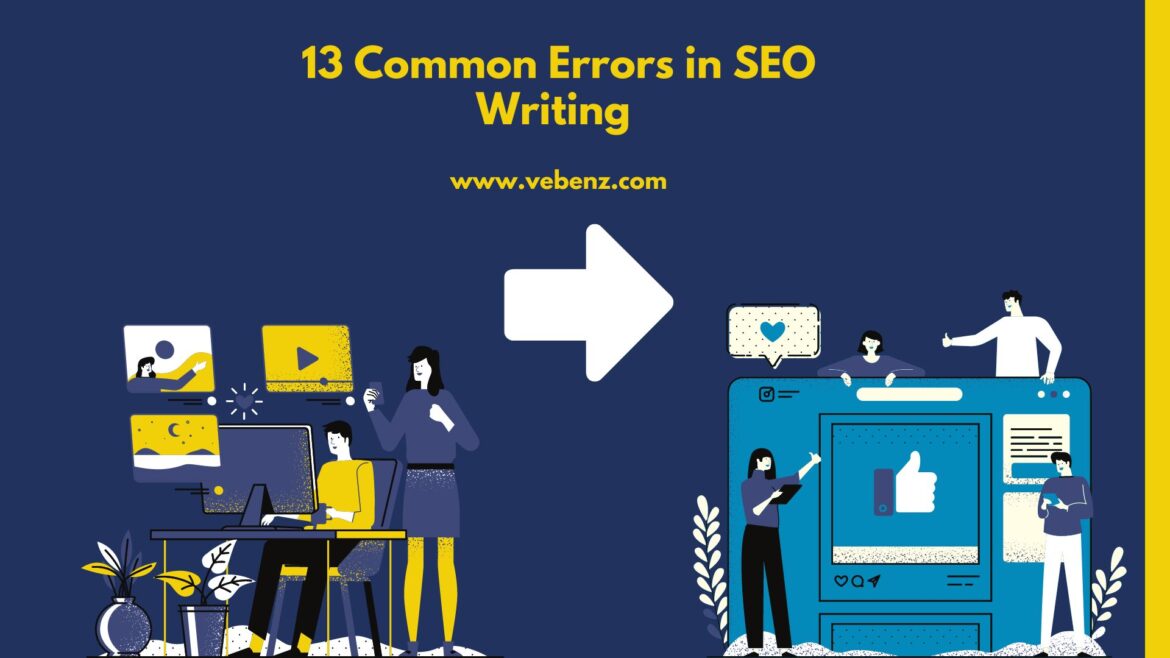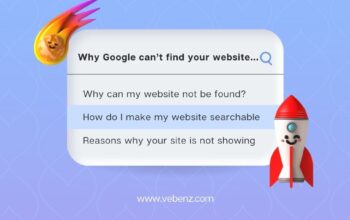I’m sure you’ve heard that there’s more to SEO writing than just stuffing keywords into a blog post. If you’re new to the field, it might be easy to make some of these common mistakes and end up with an SEO article that doesn’t rank as well as it should.
13 Common SEO Mistakes to be Avoided
If you know what makes for good SEO writing and how to avoid making those same mistakes yourself (and then explain them in your own words), then you’ll be able to get better at this important skill!
1. Using keywords incorrectly
Using keywords incorrectly is one of the most common mistakes that people make when writing SEO content. It’s easy to get caught up in a frenzy of keyword hunting and forget that you need to be sure your keywords are being used correctly in the right places, with the right context, at the right quantity, and in the right tone.
For example: If you’re writing about “digital marketing,” then it’s okay to use certain words like “marketing” or even “digital.” However, if you’re talking about something more general (like “marketing”), it might be better off being called something more specific—like “online marketing.”
2. Poor keyword research
Keyword research is the process of determining which keywords are most relevant to your website and product. It’s also important because you can use them in your content strategy, SEO copywriting, and other marketing efforts.
There are many tools available online that can help you with keyword research. Here are three free ones:
- Moz’s Keyword Research Tool – This tool allows users to filter through search results based on:
- Google Analytics nomenclature (e.g., ‘mobile’)
- Competition analysis report from SEMrush or Ahrefs
- Google Analytics Search Traffic Reports – You can see how many impressions each keyword got as well as its relative share in traffic over time
3. Not using synonyms and related terms
- Use synonyms and related terms.
Synonyms and related terms help you avoid repetition, and make your writing more natural, readable, and persuasive. When you use a word that means the same thing as another word (synonym), it will often be easier to write than when you use two different words that describe the same thing (antonym). For example:
- Instead of saying “We need more time” say “I need more time” because there is no reason for you to repeat yourself in this sentence – but if someone else had written this sentence then they might have said, “I’m having trouble coming up with some ideas for next month’s meeting so I think we should schedule another brainstorming session where everyone can pitch their ideas.” So by using “to come up” instead of just saying “to come,” I am making sure readers understand what my point is while still avoiding repetition!
4. Using too many keywords
Keyword stuffing is a common error. It’s not just about using keywords in the wrong places, but also about using them in ways that don’t make sense to search engines and your audience.
If you have too many keywords, your content will become hard for humans to read and understand, which means it won’t rank as high on Google. And if you’ve got a lot of long-tail content that takes more time to read than short stuff (like articles), then even though your page gets lots of backlinks from high-quality websites (and therefore looks good), nobody will want their link within it because there aren’t any benefits for them either!
So how do we avoid making this mistake? We need our writing skills honed so we can write naturally without sounding like someone’s talking at us through an earpiece—or worse yet: typing out every word aloud while looking at images onscreen!
5. Overusing exact-match anchor text
The second most common error is overusing exact match anchor text. An anchor text is a keyword that links to your website, and it can be used in many ways: as a keyword with no other modifiers (as in “generic”) or as a modifier with other keywords (as in “grocery store”).
The use of overly specific anchors can be a sign of link manipulation, which means that someone has tried to manipulate search results by paying for links from sites like Google or Bing. It’s also not good for Google’s algorithm because it makes it more difficult for people looking for specific information about your business to find you on page one — or even at all!
To avoid this issue altogether, try using more generic terms instead until you’ve built up enough trust among potential customers that they’ll trust you enough to click through without any prompting from their browsers’ search bars
6. Poorly optimized title tags and meta descriptions
Title tags and meta descriptions are both important for SEO.
The title tag is the most important part of your page, so it’s worth optimizing. Make sure it has a clear call-to-action, but also make sure it doesn’t include any keywords that aren’t relevant to what you’re offering on that page. Meta descriptions should always be optimized as well because they’re used by search engines when they crawl your site (in other words: Google sees them). The ideal length for meta descriptions is between 150 and 160 characters—this way, there isn’t too much text on the page that might get cut off by search engine crawlers if their eyes glaze over after reading through all those words…
7. Never rewriting or deleting old content
Rewriting old content is a great way to improve your SEO. It’s not only good for search engines but it can also be used as a template for future posts. If you want a good example of this, look no further than Buzzfeed’s “10 Things No One Tells You About Being A Dad” post which was originally published in 2013 and repurposed as an updated version in 2017.
READ: 6 Reasons Why Your Website Isn’t Appearing On Google Search Results
Another way that re-purposing old content can benefit your site is by creating new ones from scratch as well! Many blogs today have been built on top of their own archives—a practice is known as “content recycling”—and these sites have been able to build up larger audiences because they keep publishing fresh content every day (or week). In addition, some bloggers share their old posts with other people who may not know about them yet; if those readers like what they see then maybe they’ll stick around long enough until they start contributing themselves.
8. Neglecting your site’s architecture
Site architecture is the backbone of your site. It’s what makes your content easy to find and use, so it’s important that you optimize this part of your site. The best way to do this is by using a sitemap, which tells search engines where all the pages on your site are located in relation to each other—and can be especially helpful when building new pages as well as updating existing ones.
A good example of optimized site architecture would be [example website]. If you look at their sitemap (which contains links between all related pages), you’ll notice how everything flows together seamlessly: there’s no unnecessary backtracking or jumping around; everything connects naturally with each other and provides useful information about its subject matter (such as “How To” videos).
9. Not making use of heading tags (particularly H1s)
Headings are a great way to structure content and make it easy for readers to navigate. When you’re writing an article, try to use headings in the following ways:
- Use H1s (the biggest possible heading) as your main title. This is what most people will see when they land on your page before they scroll down. It’s also important to note that this should be only one line of text, no more than three words long!
- Use H2 or H3 tags as subtitles under each sub-subtitle until you reach H5 tags at the bottom of your post or page; then use those same tags again under all subsequent sub-subtitles until another subtitle comes up where another subtitle appears (like so). This helps keep things organized because it’s easier for readers who don’t know much about SEO jargon yet still want a sense of progression throughout each section without having everything thrown together haphazardly!
10 Neglecting to write for humans first (and search engines second)
This is a big one. If you’re writing for search engines, you need to give them what they want: keywords. They don’t care about how your content will help readers or whether it’s written in a way that makes sense. They only care about keywords, so if there aren’t any in your article (or if there are too many), then it won’t be ranked well by Google.
You also need to make sure that any information or solution provided in the text of your article benefits both humans and machines—not just one side over another! For example, “SEO” has become synonymous with “keyword stuffing,” but there’s no reason why we can’t say “SEO writing” instead of just “keyword stuffing.” The same goes for all kinds of other technical terms: H1 tags; H2 tags; alt tags…you get the idea!
11. Not optimizing your URLs
One of the most common errors in SEO writing is not optimizing your URLs. If a URL is too long, it may not appear in search results or be crawled by Googlebot. If a URL contains unnecessary characters (such as “www”), it won’t be indexed by Google.
The length of your URLs depends on how much content you want to include in them and how relevant each piece of information is to what you’re trying to say—but keep in mind that shorter is always better!
12. Poor mobile search optimization (or no optimization at all)
Mobile search is growing, and Google has made it easier than ever to optimize your website for mobile devices. If you’re not already doing so, now is the time to start!
Mobile devices are used more often than desktop computers by millions of people around the world every day. This means that if your site isn’t optimized for mobile users, they’ll find it harder and less appealing than if they had access to a proper version of your content on their smartphones or tablets.
13. Not linking out to authority sites regularly enough.
Linking out is a great way to get your website’s authority recognized. It doesn’t matter if you’re building up a new site or re-building an existing one: linking out will help bring more visitors, especially if they can be convinced that you are a trusted resource in the industry.
Here are some tips for linking out:
- Make sure that all of your authority sites are relevant to the content on your site—or at least, have some connection with what you’re writing about.* Don’t just link back to other people’s sites because it’s easier than creating content yourself.* Make sure that any external links are relevant as well; don’t just link back to any page on another website (that would be spammy).
SEO writing is complicated, but by avoiding these mistakes, you can get better at it.
SEO writing is a complicated field, and there are many ways to get it wrong. By avoiding these common errors in SEO writing you can improve your skills as an SEO writer.
- Missing the point: A lot of people make the mistake of stating something too strongly or too directly. For example, instead of saying “We offer free shipping” you could say “We offer free shipping on all orders over $50.” This will have a much stronger effect than just using the word “free” because it shows that you understand why people might be interested in your product or service (i.e., they want something for nothing). The second version also makes it clear that there’s no catch; customers know exactly what’s going on here and won’t feel duped into buying something that isn’t actually free after all (at least not until after they receive their order).
- Using jargon: Jargon refers to the specialized language used by certain groups within society which may be unfamiliar territory for many readers who aren’t familiar with those terms/idioms themselves—dictionaries provide helpful definitions so keep scrolling down until we’ve reached one 🙂
Conclusion
SEO writing is not an easy skill to master. It’s a complicated process, and there are so many different elements to take into consideration when writing for the web. But if you follow the tips in this article, and keep practicing, then you can become a better SEO writer—and maybe even start developing your own content strategy!


